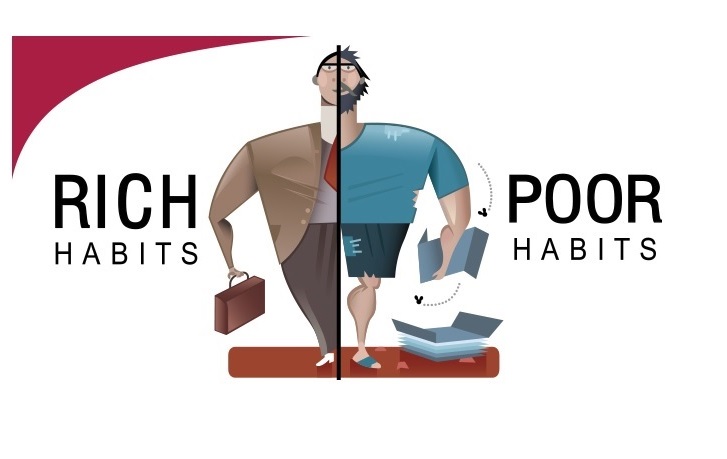
When you discover worth in these articles, please share them together with your interior circle and encourage them to Signal Up for my Wealthy Habits Every day Suggestions/Articles. Nobody succeeds on their very own. Thank You!
TOM@RICHHABITS.NET
In a world obsessive about get-rich-quick schemes, the actual barrier to wealth usually lies within the delicate, each day selections we make. Tom Corley, CPA and writer of Wealthy Habits: The Routines Millionaires Use Every day That Will Assist You Construct Wealth, spent 5 years learning the behaviors of 233 rich people—outlined as these incomes over $160,000 yearly with $3.2 million in web property—and 128 lower-income individuals incomes underneath $35,000 with lower than $5,000 in liquid property.
His groundbreaking analysis, featured on www.richhabits.web and profiled in retailers like CNBC and SUCCESS Journal, uncovered over 300 habits separating the wealthy from the poor.
Shockingly, 40% of our each day actions are autopilot habits that dictate monetary future.
Whereas the rich construct empires by way of disciplined routines, the poor sabotage themselves with 5 insidious habits. Breaking them may tip your seesaw towards success. Let’s dive in.
1. Losing Hours on TV and Social Media and Binge-watching or scrolling endlessly? You’re not alone—nevertheless it’s costing you dearly. Corley’s knowledge reveals 77% of poor individuals watch actuality TV exhibits each day, in comparison with simply 23% of the wealthy. Moreover, 62% of rich people restrict non-work Web use to underneath an hour, whereas the poor common way more. This “poor behavior” devours the 240 discretionary minutes all of us have each day, time the wealthy use for self-education or networking.
Third-party validation comes from a Columbia College examine displaying how such passive consumption triggers addictive cycles, mirroring smoking’s gateway to worse behaviors.
Swap the distant for a ebook—94% of millionaires learn half-hour each day for progress—and reclaim your future.
2. Spending Extra Than You Earn
Residing paycheck to paycheck? It’s a lure. Corley’s findings present poor people usually spend past their means, resulting in debt spirals, whereas 88% of the wealthy save no less than 10-20% of earnings.
This overspending cascades into “switch results,” like bank card overuse or consolation consuming, eroding wealth-building potential.
Corley emphasizes budgeting as a cornerstone behavior. Echoing this, Indiana College analysis confirms keystone habits like prudent saving foster more healthy selections throughout life areas.
Observe bills right now—apps like Mint can assist—and watch compound curiosity work its magic.
3. Skipping Every day Self-Schooling
Information is energy, but 70% of poor individuals by no means learn for self-improvement, versus 88% of the wealthy who achieve this each day.
Corley’s examine hyperlinks this hole to stunted profession progress; with out studying, alternatives go you by. His web site particulars how millionaires dedicate time to business information, turning novices into consultants. An evaluation of Tom Corley’s Wealthy Habits knowledge validates this, noting early risers achieve hours for strategic studying, aligning with Harvard research on lifelong studying boosting earnings by 20%.
Decide to half-hour of podcasts or articles—your mind’s ROI will skyrocket.
4. Playing and Searching for Fast Wins
Dreaming of lottery jackpots? Corley discovered 77% of poor play the lotto weekly, whereas zero rich do—it’s a “lottery mindset” fostering on the spot gratification over persistence.
True wealth calls for deliberate apply, not cube rolls. Richhabits.web tales spotlight how self-made millionaires endure failures and learn to survive till they thrive.
Behavioral economists at Yale corroborate Corley’s findings: playing erodes delayed gratification, a trait in 80% of high-net-worth people per SUCCESS Journal.
Redirect your idle time into skill-building.
5. Surrounding Your self with Unfavourable Influences
Your circle creates your ceiling. Corley notes poor individuals gossip 6.5 hours weekly, versus 0.5 for the wealthy, who community with mentors. In reality, 93% of the self-made credit score success to their mentors.
Toxicity breeds complacency. A Barnes & Noble evaluation of Wealthy Habits Poor Habits affirms: constructive networks amplify habits, backed by Australian psychology research displaying accountability companions double objective achievement.
Audit your contacts—search uplifters.
Corley’s work, validated by international media and academia proves habits are selections. Ditch these 5 Poor Habits, undertake their opposites, and millionaire standing isn’t a dream; it’s inevitable.
Begin small, keep constant. Your reward shall be wealth.




